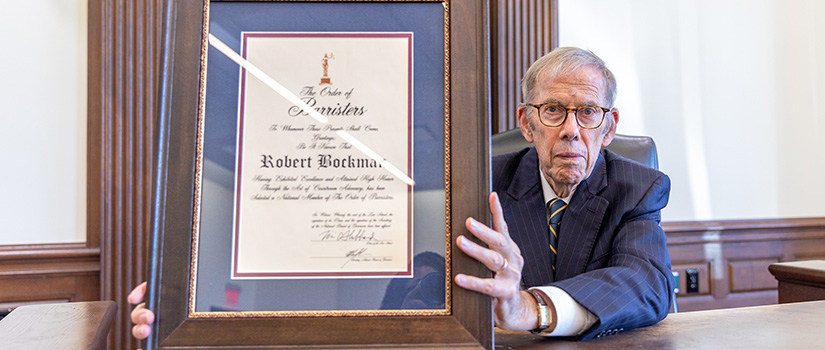Only the top eight law students in the annual Kate Bockman Memorial Moot Court Competition qualify for induction into the Order of Barristers, but on October 15, nine people were recognized.
The national honor society is designed to celebrate excellence in trial advocacy, oral advocacy, and brief writing. The last honorary inductee from the USC Joseph F. Rice School of Law was Judge J. Michelle Childs (‘91) in 1992, that is, until Bob Bockman, senior legal writing instructor, was recognized.
Bockman, known affectionately as “Professor B,” holds appellate work in high regard. He says that as, “the place where law is made,” the Court of Appeals and the Supreme Court are the perfect avenue “to show your utmost respect for our legal system.”
He spent the first two decades after graduating law school in practice. Then, in 1993, he became an adjunct professor at the Rice School of Law.
Bockman remembered being inspired by his professors' energy, enthusiasm and entertaining approach to teaching when he was a student. As an educator, he drew from their model, incorporating his own sense of compassion and intentionality.
"There's just something about an email from Professor Bockman that you can't help but smile, the way that he wordsmiths everything,” 3L Hollie Duchnowski says. “He treats everyone with such respect. You can tell he loves to teach... so you want to keep going back and getting more advice, learning more, and he's just so willing to give it.”
Bockman considers law practice a service and takes the time to instill his own deeply held respect for the law and a lawyer’s part in it. That commitment to law students earned him the Order of the Palmetto in 2009, South Carolina's highest civilian honor.
“He’s just the perfect professional, gentleman lawyer,” says S.C. Court of Appeals Judge Blake Hewitt (‘05). “Appellate practice, especially the way that Bob Bockman taught it, was that it is the expression of very best qualities of lawyers as professionals and it's in the context of trying to litigate a case.”
That mentality is shaped at least in part by Bockman’s belief that lawyers are artists and how, like artists, “you cannot separate the advocate from the advocacy.”
“It is an art that we're engaged in. We're conveying ourselves as much as we are the interests of the client,” Bockman says. “What we are to present is ourselves as part of the argument – this sense of trustworthiness, this sense of reliability, this sense of respect, this sense of honor.”
Those sentiments also inform his volunteerism with the Moot Court Bar, where law students hone their appellate advocacy skills.
"My research and writing skills have improved tremendously, especially writing persuasively,” says Duchnowski, who qualified for induction into the Order of Barristers last year as a 2L.
Moot Court also gives students like Duchnowski opportunities rare even among attorneys, like arguing in front of South Carolina Supreme Court Justices. And as an established student organization, many employers – especially those seeking law clerks – look for Moot Court experience.
Hewitt, who was captain of the National Moot Court Competition team when he was a student, says the experience was “foundational” to his legal career.
“When I left law school, I wasn’t sure what I was going to do, but I enjoyed appellate cases, and so, with Professor B's encouragement, I sought a position as an appellate court clerk.” Since then, Hewitt’s career has been dedicated to the appellate field.
Bockman has mentored generations of law students and young lawyers, handwriting countless letters of recommendation and commendation for award recipients. Expressions of gratitude and celebration are a trademark of his, and his students welcomed the opportunity to return the favor.
“I think professors are probably kind of like parents in a way that you don't necessarily feel appreciated, at least in the moment, and you wonder if you impacted anyone,” Duchnowski says. “I hope that this is a clear way for Professor B to say, ‘you know, what I did. Now there's no doubt about it.’”
Bockman didn’t qualify for induction into the Order of Barristers when he was a student, but his award now hangs in his office alongside his daughter’s. It was a touching moment for the Bockman family that “Professor B” received his award at the competition named in Kathryn Anne Bockman’s (‘08) memory.
“I was not a great student,” he says with a chuckle, “Kate was. She loved the Moot Court Bar and so it didn't take her long to just be right back in doing it as a graduate.”
